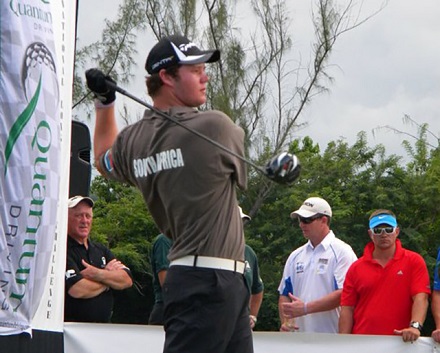

Now that golf is back in the Olympics, golfers with physical challenges would like to see it added to the Paralympics.
The arguments in favor are sound: it is open to men and women, uses the same sports facilities and already has a strong player population worldwide.
Of course, whether golf will actually be in the Paralympics any time soon is up for debate. The roster of adaptive sports for Paris in 2024 was finalized in 2019 and the IOC isn’t big on changing its mind. (And in case you’re wondering, the BBC has noted that the International Paralympic Committee said Paragolf did apply for Paris 2024 but "was not fully compliant with the set of requirements for inclusion").
Therefore, assuming the sport can meet the compliance standards, LA 2028 is the next logical entry point.
And pro-paragolf sentiment in the U.S. is strong, says KWWL in Waterloo, Iowa. In fact, it notes that the population playing adaptive golf has been growing rapidly now for several years, and its potential for growth is enormous. It's estimated there are between 60 and 80 million Americans living with a disability. It hasn't been determined exactly how many disabled Americans are playing adaptive golf, but some 18 million of those individuals played golf before their disability.
One thing that could have been holding golf back from the Paralympics is the sheer number of different players with different physical challenges, from amputations to spinal cord injuries to dwarfism, and medical issues like spina bifida, cerebral palsy or a stroke that has caused physical limitations – as well as an enormous variety of other issues. These have resulted in an incongruency in the ways various countries have held competitive issues for those populations.
In the U.S., many event owners classify players according to the severity of their various physical obstacles, the way tennis does, and organizes competition among each group of players. In other competitions and in other countries, players are handicapped according to their various challenges, but will still play one another. Still others will have one tournament and everyone will play, regardless of challenges.
Brendan Lawlor of Ireland, currently the world’s top golfer with a disability, told BBC reporters he believes multiple classifications and handicapping have made the game unnecessarily complicated, and that streamlining it will allow for more players.
"I think the reason why golf is not in the Paralympics is because they think they have to give out many different categories of medal and that's just not the case," said the 24-year-old. “On the European Tour, the best disability players, men and women, compete for one prize. That's what we're trying to bring to the board, to show that there's probably 30 or 40 players that could compete at the Paralympics, for three medals."
Lawlor, who has Ellis-van Creveld syndrome, a bone growth disorder that leads to shorter limbs, competes against players "with many different disabilities.”
"We are all in one bunch and it doesn't matter what your disability is, we can all play together. Look at Bryson DeChambeau, he can hit the ball further off the tee, but other players might be better from closer in, and that's the same for disability golfers," he added.
Within the U.S., multiple programs exist, usually at the local level, to get golfers with disabilities back onto the course – or even onto it for the first time. The Georgia State Golf Association (GSGA)’s Adaptive Golf Program, offering programs on nearly two dozen courses, is one of these. Another is the non-profit program, Adaptive Golf Iowa.
The PGA partners with the US Adaptive Golf Alliance, an organization whose web page includes a full listing of adaptive golf tournaments. In past years, the ParaLong Drive Cup offered competitions to a range of athletes.
Cory Watson, President of the Iowa Amputee Golf Association says golf deserves to be a paralympic sport because of the skill of the players.
Plus, Watson says. “I'd love to see it. I'd love to play in it someday. The sport itself is really growing in the adaptive golf space.”
If adaptive golf continues its lobby to become part of the Paralympics (a decision is expected to be made on any additional sports sometime this year), event owners can expect an uptick in the number of players becoming interested in programs. And, notes KWWL, new equipment is always coming along to expand the possibilities for golfers. The Solo Rider Golf cart, for example, provide increased accessibility, making it possible for athletes to golf without leaving the cart.
And with every athlete comes a story. At a GSGA adaptive clinic, amputee Chris Hansen noted that he has actually played far more since discovering adaptive golf than he did prior to surgery.
“For most of my life, I might have only played 10-12 rounds in a year,” Hansen said. “Now, I try to get out as much as I can. The biggest thing it’s done for me is I only get my swing up to about shoulder height now. But looking on the bright side, it does lessen the amount of space I have to (mess) up my swing.”

